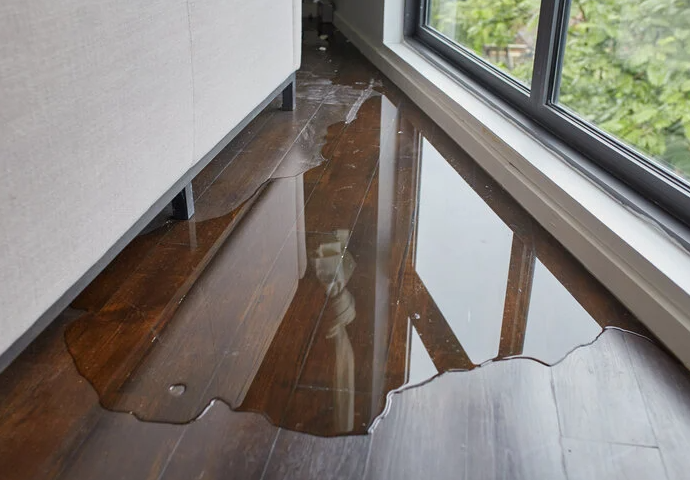Discovering water leaks in your apartment can be a hassle, but staying vigilant can help you catch them before they turn into a costly disaster. Leaks can spring up anywhere – from under the sink to below the bathroom tiles – and knowing how to spot them is crucial for any renter.
Firstly, keep an eye out for obvious signs like damp spots, mold growth or a persistent musty smell. These can all indicate hidden moisture issues. Check places that are prone to water accumulation, such as the area around your toilet, shower, and kitchen sink. Don’t forget to listen for drips or running water when all taps are turned off – this could be a giveaway that there’s a leak lurking behind the walls.
Using your water meter can also provide clues. If you notice unexpected spikes in your water bill, it could be a sign of a leak. Be sure to monitor it over a few hours when no water is being used; if the meter changes, it’s likely you have a leak to address. By staying aware and taking the right steps to detect leaks early, you can save yourself a lot of time, money, and stress down the line. Remember, quick action is key to minimizing damage in your apartment.
Spotting Water Damage: Clues to Discover Apartment Leaks
Being a tenant, finding water leaks in your apartment can save you from unwanted damages and hefty repair bills. Water damage does not only affect your domestic tranquility, but if left unattended, can lead to more serious structural issues. Here’s how to be your own detective and discover any water leaks.
- Discoloration: Notice any yellow or brown stains on the ceilings, walls, or floors? This discoloration might be shouting ‘leak’!
- Peeling Paint or Wallpaper: Paint or wallpaper that’s peeling or bubbling is often a sign that water is lurking behind.
- Musty Odors: Trust your nose! A persistent musty smell could indicate hidden moisture and mold growth due to leaks.
- Warped Floors: If your floors are buckling or warping, it’s time to search for the source of the water causing this deformation.
Listen and Learn: The Sounds of Leaks
Leaks can be sneaky, but they often come with an auditory giveaway. Be alert to dripping, running, or hissing sounds, even when all taps and water fixtures are turned off. These noises can point you to the location of a clandestine leak.
Utility Bills Spiking? Could Be a Leak
An unexplained surge in your water bill might be the silent alarm that there’s a leak somewhere. If you can’t find any visible signs, see if you notice any inexplicable changes in your monthly water usage – it could be your biggest clue.
Mold and Mildew: More than Just a Health Hazard
Mold and mildew don’t just threaten your health; they’re also tell-tale signs of water intrusion. Keep an eye out for fuzzy or slimy growths around your apartment, especially in frequently moist areas like bathrooms and kitchens.
Detect Leaks with DIY Tactics
Want to test for leaks on your own? Dye tests in the toilet or listening for leaks with a screwdriver against the pipes are clever, DIY leak detection approaches. They could reveal problematic leaks that need professional attention.
Professional Leak Detection Services: A Worthy Investment
While identifying leaks as a renter can be fairly straightforward, fixing them often requires expertise. At Ultrices Lekdetectie, we offer non-invasive, accurate leak detection without causing damage to your property. Plus, with our no cure no pay policy and VCA certification, you can trust in our professional prowess and commitment to solving your leakage issues.
Call to action: Looking for expert assistance in finding that pesky leak? Ontdek onze waterleidinglekkage services today and get peace of mind with our thorough leak detection solutions. Dealing with a challenging and stubborn leak in your apartment? Don’t wait for it to exacerbate. Connect with Ultrices Lekdetectie, and we’ll not only identify the source of the leak but provide a comprehensive expertise report within 3 working days.
Say goodbye to guesswork and hello to a dry, worry-free home.Whether it’s a suspicious spike in utility bills or a musty odor that won’t go away, these are signs you shouldn’t ignore. Recognizing and addressing leaks promptly can save you from the stress and cost of extensive water damage. Ready to uncover and fix leaks in your apartment with the help of seasoned professionals? Leer meer over onze badkamerlekkage services. With our expertise, your apartment will be leak-free in no time.
FAQ: How Can Renters Identify Leaks in Apartments?
1. What are common signs of water leaks in an apartment?
It’s like playing detective in your own home. First, keep an eye out for tell-tale signs like damp spots on walls, ceilings, or floors. They often betray hidden leaks. Musty odors can also be a clue—like a breadcrumb trail leading you to the source. Check under sinks and around appliances like your dishwasher and refrigerator, as leaks love to hang out there. Don’t forget to listen for the drip-drop of a sneaky leak, especially at night when it’s quiet.
2. How do I check for leaks under sinks and appliances?
Sneak a peek under the sink now and then. Look for any water or signs of damage like warping or discoloration. Seeing puddles or finding a sponge that’s mysteriously soaked without your doing? That’s a red flag. For appliances, pull them gently away from the wall if you can and scout for any puddles or wetness on the connections. It’s like a mini adventure behind your appliances.
3. Can mold indicate a water leak in my apartment?
Absolutely! Mold is like a leak’s best friend; it thrives on hidden dampness. If you spot mold or mildew on walls, ceilings, or in corners, there’s likely a leak somewhere playing host. These spots can be subtle, so keep your eyes peeled for any unusual discolorations or fuzzy growths. Remember, your nose can also lead the way—musty smells might as well be a flashing neon sign saying, “Leak Nearby!”
4. How can I check my apartment for toilet leaks?
Want a quick mission? Drop a couple of food coloring drops into your toilet tank. Don’t flush! Wait for about 30 minutes, and then see if the bowl has changed color. If it has, you’ve got a leak between the tank and bowl. Congrats, detective, you’ve cracked another case!
5. Should I monitor my water bill for fluctuations to spot leaks?
Yes, dig into those water bills like a financial sleuth! If your water usage is climbing faster than a cat in a tree, but your daily habits haven’t changed, a leak might be the culprit. Keep an eye on your monthly bill; even small leaks can make it balloon over time. It’s a subtle clue that something’s amiss in your apartment’s plumbing underworld.

